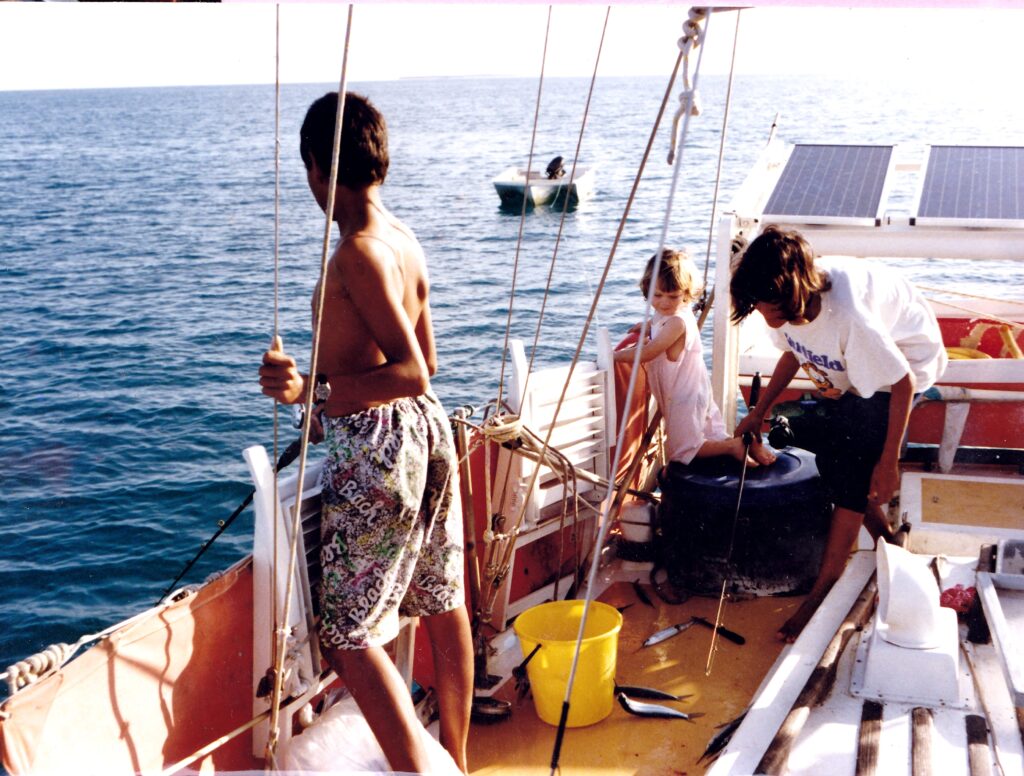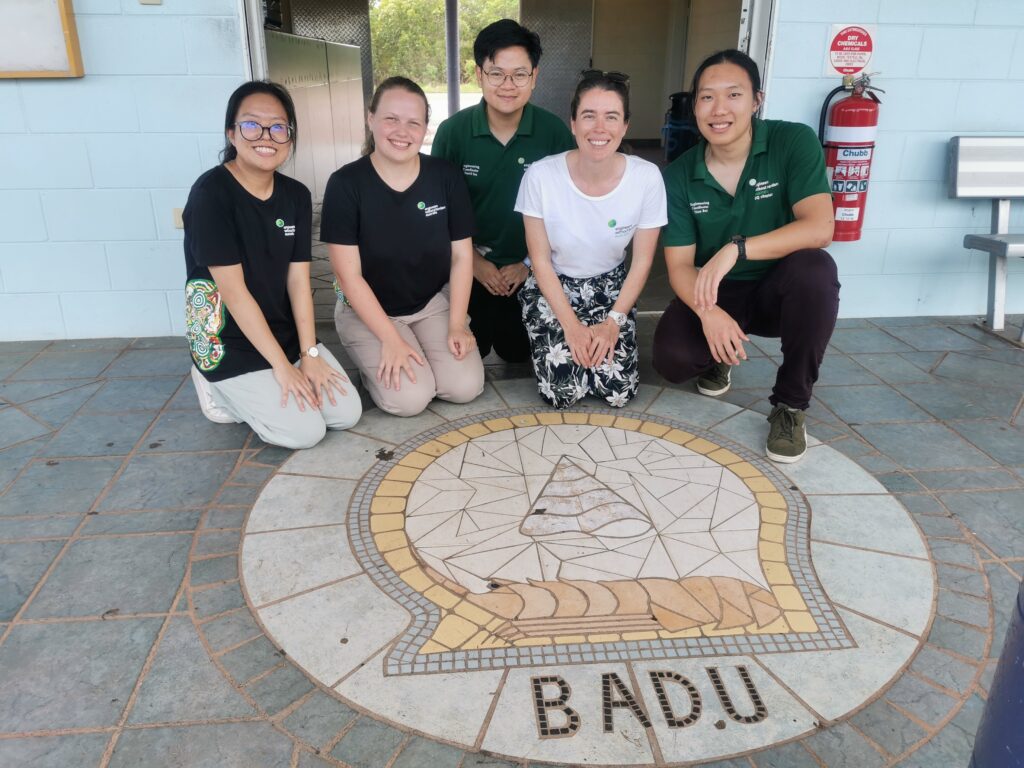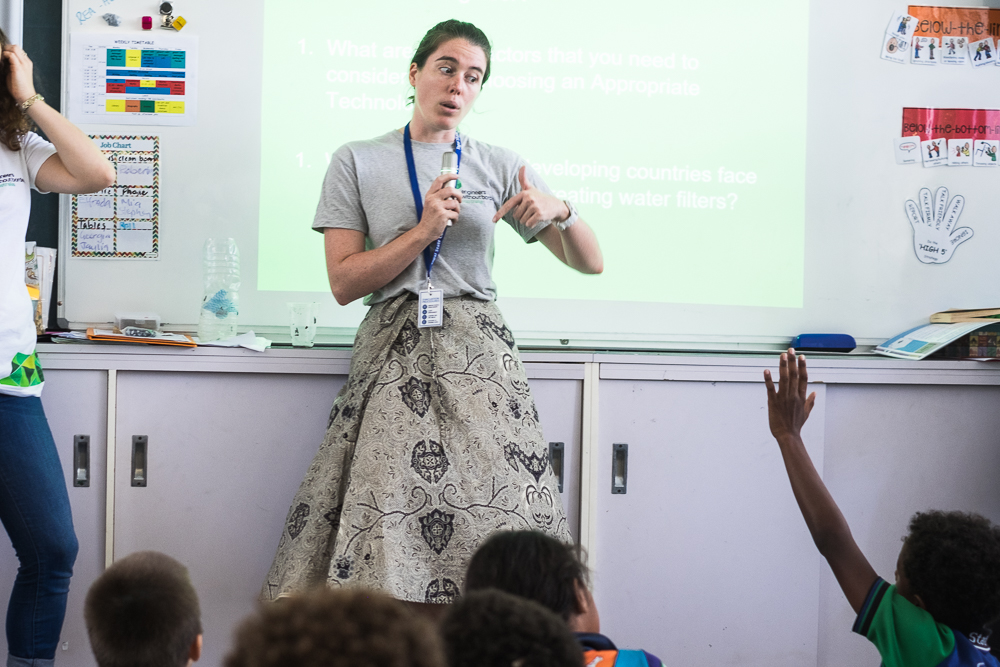Pictured: Erin running a Youth Outreach workshop with primary school students in the Torres Strait
Growing up on a boat in the Torres Strait until she was 14, water was an integral part of Erin Hughes’ childhood. Today, it’s the focus of her work as an engineer.
After completing a Chemical Engineering degree at the University of Queensland, Erin is now a Surface Water Engineer at Hydrology and Risk Consulting in Victoria. She works in flood engineering and hydrology, working with emergency services to manage flood risks and providing technical input to dam operators across Australia.
Alongside her engineering job, Erin leads EWB outreach initiatives in remote communities that educate students about the possibilities of a career in engineering.
Path toward engineering

A young Erin on a fishing boat with her family in 1992.
Erin grew up in the Torres Strait on her family’s commercial fishing boat. Throughout much of her early childhood, her family lived in very remote areas, sometimes spending up to 5 months of the year in almost complete isolation.
“It was an absolutely wonderful upbringing. I pretty much didn’t wear shoes until I was 14, when I went to boarding school.”
Erin and her siblings were homeschooled by their mother, whose approach prioritised hands-on learning and connecting their education to their Torres Strait community and the world around them. It wasn’t until she started attending boarding school in Brisbane that she first sat in a classroom.
When Erin finished high school, she wasn’t immediately sure of her career path, initially considering a TAFE course in mechanics. She instead travelled overseas on a Rotary Exchange program for a year, where her experiences cemented her desire for a career that could enable community-led change.
Erin then commenced a Chemical Engineering degree at the University of Queensland. She found it challenging – studying heavily theoretical engineering subjects, it was difficult for Erin to understand the purpose of her studies when it wasn’t grounded in a real-life context. To date, she says her degree is the hardest thing she’s ever done.
However, when she started a graduate job working as an engineer for her local council, Erin loved seeing what engineers were capable of doing and knew it was the right career path for her.
“I adored the work, and knew that this was the right job for me, and I just had to get through the degree.”
Improving Youth Outreach
While Erin had come into contact with EWB during her first year of university through the EWB Challenge, it was during her professional career that she started volunteering with EWB through the Youth Outreach program. Erin supported projects targeting Aboriginal and Torres Strait Islander communities, running knowledge hubs and partnerships with communities in South East Queensland.
While delivering Youth Outreach workshops, Erin was seeking ways to improve the program. In particular, she realised the need to target students with outreach efforts at a younger age. While the Youth Outreach program was aimed at Year 11 and 12 students, Erin found that targeting this later stage of students’ education was often too little, too late to make lasting, systemic change. To spark an interest in STEM, she realised consistent engagement all the way from primary school was crucial.
Erin refocused her efforts towards outreach workshops for primary school students in the Torres Strait, aiming for consistent, long-term engagement from prep to year 6. These workshops continued over the course of the students’ primary school education, with the aim of embedding knowledge and interest in engineering through continuous engagement.
“It needed to be recurring. We needed to build trust within these communities, we wanted to re-engage the same students every year.”
Erin’s aim was that students would come away with improved understandings of who engineers are, what they do and what they are capable of.

Erin on a Regioneering trip with volunteers from the EWB University of Queensland Chapter.
Measuring outreach impact
In 2019, Erin’s passion to see change in the Youth Outreach program led her to secure a grant from MECCA M-Power, which focuses on supporting educational opportunities for women and girls. Erin used this funding to conduct research measuring the impact of EWB’s outreach programs on communities in the Torres Strait. Her goal was to determine whether the workshops were achieving their aims, and provide solid evidence of the program’s impact.
Her research method involved interviewing 30 primary and high school students, who had varying levels of engagement with EWB over a period of up to 5 years. Students were asked questions on what they thought an engineer did, and whether they could apply this knowledge to what engineers could do in their own community.
Her research showed that students had a deeper understanding of engineering following the workshops, and that they were able to connect it to their local community. As part of Erin’s research on representation and challenging stereotypes, children were asked to draw a picture of an engineer.
“We were really interested to see whether they were identifying someone who looked like them, whether that was of a different ethnic background, whether it was female or male.”
Erin found the results were promising, with students who had been engaged previously generally drawing engineers from different backgrounds and genders instead of the “typical white male”.
An engineer for everything
Erin’s unique upbringing gave her an ongoing connection to her community, which continues to shape her professional and volunteer work. Growing up in the Torres Strait, Erin gained a first-hand awareness of diverse forms of learning and knowledge, and the importance of place-based approaches. In her engineering work today, she emphasises that solutions to problems must be tailored to their specific environment and value local expertise.
“No matter how amazing a solution might be to a problem, if it’s not actually tailored to the community and working with that culture and that community… it’s not going to work.”
This approach also feeds into her outreach work, where she stresses to students the value of their own local knowledge and sense of place. It’s this diversity of experiences that Erin believes is what makes engineering a great career path.
“There’s an engineer for everything, and as an engineer you can create a job that’s just for you.”
In 2024, Erin will embark on a trip to Antarctica with Homeward Bound, a leadership initiative for women with a background in STEMM (Science, Technology, Engineering, Maths and Medicine). Homeward Bound’s vision is to equip a 10,000-strong collaboration of women with the skills to demonstrate a new model of leadership and proactively contribute to a sustainable future. Erin was selected as one of only 103 applicants globally to participate in this program.
Erin is seeking support to enable her to take part in this initiative. You can learn more about Erin’s journey to Antarctica with Homeward Bound by visiting her page here.
About the ‘Futur-neers’ program: This series is funded by the Australian Government Department of Industry, Science, Energy and Resources through the ‘Women in STEM and Entrepreneurship’ grant program. The program focuses on deeper support and amplification of EWB’s Youth Outreach volunteer network, with a particular focus on empowering women in engineering.
To read about our other incredible ‘Futur-neer’ role models in the EWB Chapter network, click here.


